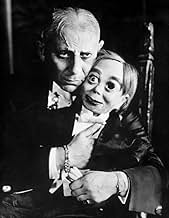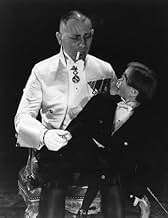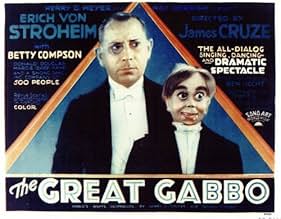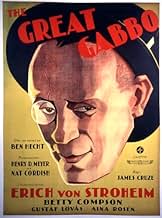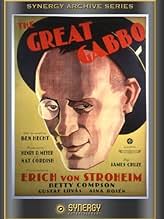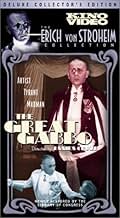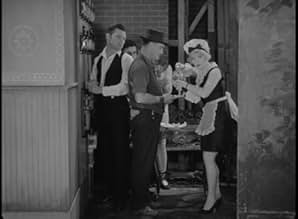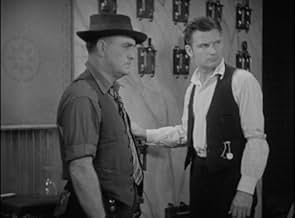IMDb RATING
6.0/10
1.1K
YOUR RATING
An insanely, egocentric ventriloquist, even though he is possessed by his wooden dummy, is in love with a dancer who is in love with another. The dummy gives advice to the ventriloquist.An insanely, egocentric ventriloquist, even though he is possessed by his wooden dummy, is in love with a dancer who is in love with another. The dummy gives advice to the ventriloquist.An insanely, egocentric ventriloquist, even though he is possessed by his wooden dummy, is in love with a dancer who is in love with another. The dummy gives advice to the ventriloquist.
Erich von Stroheim
- The Great Gabbo
- (as Eric Von Stroheim)
Marjorie Kane
- Babe
- (as Margie 'Babe' Kane)
George Grandee
- Otto
- (voice)
- (uncredited)
Bo Peep Karlin
- Dancer
- (uncredited)
Rosina Lawrence
- Dancer
- (uncredited)
Harry Ross
- Performer
- (uncredited)
Eddy Waller
- Vaudevillian
- (uncredited)
Marbeth Wright
- Dancer
- (uncredited)
- Director
- Writers
- All cast & crew
- Production, box office & more at IMDbPro
Featured reviews
The Great Gabbo "The Great Gabbo" is one of the finest examples of American Communist Propaganda films of the early 1900's existent today. It is a master piece of film literature, when you consider the limitations of the technology of the day. Vitaphone, the technology used to cut a vinyl record of the speech or music as the action was filmed, was new and very expensive, and made film editing a nightmarish chore if not impossible.
The script employ's Epic Theater techniques taught by Bertolt Brecht. In this respect it is a thinker's film, the film forces you to think. From the very beginning to the end you are constantly quizzical about behavior, motivation and environment. This is a musical comedy, right? How and why is the title card segment at the beginning of film different from other "musicals". Meet the self-absorbed individualist Gabbo who never acknowledges others who help him gain fame, his ventriloquist dummy Otto, and his stage partner Mary.
We soon realize that Gabbo has very superstitious religious beliefs. While he does not perform a sign of the cross, we know that he operates under the fear of his destined fate from unseen mystical powers. For instance when Mary inadvertently places his hat upon the bed, Gabbo calls Mary a foul name saying "Don't you know that it is bad luck?" Mary, in response, lists a series of activities which might displease and bring about the wrath of an angry immortal. She is more practical stating, "We make our own bad luck." The comparative is the communist environment of the musical theater. Everyone works and does their part for the betterment of the show. Here, once Mary leaves Gabbo, she too climbs to the top and find success in her profession as a singer and dancer with her partner/husband Frank. Gabbo and Mary are both successes in their professions, who then is happier? Who is more honest in their success? Capitalism is treated as an impertinent side note to the values being discussed. Capitalism is the financier management of the show and it seeks gain through investing in both ideals.
The film contrasts individualism versus communism. Many reviews have missed the underpinning effort of the writers and directors to use epic theater, and there blatant agenda to use it to teach the values of communism. They often deride the films production numbers as being unpolished and lacking flair. I ask, how could a film made with the intent to teach communistic ideals express them more eloquently? The ideal of community is not a flawless world, but a world where everyone does what they can to contribute to the whole. Some dancers lag behind the others yet they are there doing there part. Some simply walk from one place to another. The stage is full, busy and the message is understood. The imperfect dance numbers, in the epic theater style, emphasize the communistic ideal not detract from it. Few people would dare be as direct today.
The sad thing about communism's failure is that without community all we have left is individualists who, like Gabbo, are only self-absorbed and care nothing for their neighbor, nor acknowledge supportive people.
This film is a treasure that should be studied over and over. There are so many messages you simply can not absorb them in one viewing.
Watch for Otto's "I'm laughing" song sequence, it is a precursor to Bobby McFerrin's "Don't worry, Be Happy." An interesting comparison is with this film's theater community and with the community environment of Los Angeles in the modern movie "Crash." How are they the same? How are they different? How are messages of these two films different? How are they the same? Think about it.
If you don't own a copy of these films you should. I give "The Great Gabbo" two thumbs up and a black and blue stubbed toe. I guess I'm a little like Maryaccident prone. Oh and have a nice day. Be Happy!
The script employ's Epic Theater techniques taught by Bertolt Brecht. In this respect it is a thinker's film, the film forces you to think. From the very beginning to the end you are constantly quizzical about behavior, motivation and environment. This is a musical comedy, right? How and why is the title card segment at the beginning of film different from other "musicals". Meet the self-absorbed individualist Gabbo who never acknowledges others who help him gain fame, his ventriloquist dummy Otto, and his stage partner Mary.
We soon realize that Gabbo has very superstitious religious beliefs. While he does not perform a sign of the cross, we know that he operates under the fear of his destined fate from unseen mystical powers. For instance when Mary inadvertently places his hat upon the bed, Gabbo calls Mary a foul name saying "Don't you know that it is bad luck?" Mary, in response, lists a series of activities which might displease and bring about the wrath of an angry immortal. She is more practical stating, "We make our own bad luck." The comparative is the communist environment of the musical theater. Everyone works and does their part for the betterment of the show. Here, once Mary leaves Gabbo, she too climbs to the top and find success in her profession as a singer and dancer with her partner/husband Frank. Gabbo and Mary are both successes in their professions, who then is happier? Who is more honest in their success? Capitalism is treated as an impertinent side note to the values being discussed. Capitalism is the financier management of the show and it seeks gain through investing in both ideals.
The film contrasts individualism versus communism. Many reviews have missed the underpinning effort of the writers and directors to use epic theater, and there blatant agenda to use it to teach the values of communism. They often deride the films production numbers as being unpolished and lacking flair. I ask, how could a film made with the intent to teach communistic ideals express them more eloquently? The ideal of community is not a flawless world, but a world where everyone does what they can to contribute to the whole. Some dancers lag behind the others yet they are there doing there part. Some simply walk from one place to another. The stage is full, busy and the message is understood. The imperfect dance numbers, in the epic theater style, emphasize the communistic ideal not detract from it. Few people would dare be as direct today.
The sad thing about communism's failure is that without community all we have left is individualists who, like Gabbo, are only self-absorbed and care nothing for their neighbor, nor acknowledge supportive people.
This film is a treasure that should be studied over and over. There are so many messages you simply can not absorb them in one viewing.
Watch for Otto's "I'm laughing" song sequence, it is a precursor to Bobby McFerrin's "Don't worry, Be Happy." An interesting comparison is with this film's theater community and with the community environment of Los Angeles in the modern movie "Crash." How are they the same? How are they different? How are messages of these two films different? How are they the same? Think about it.
If you don't own a copy of these films you should. I give "The Great Gabbo" two thumbs up and a black and blue stubbed toe. I guess I'm a little like Maryaccident prone. Oh and have a nice day. Be Happy!
This is a strange little number because it's a pretty dark subject matter, which at times is pretty chilling to watch, but then they throw in lots of songs. I'm not too sure what the Directors were going for when they filmed this. I say this because it's evident, at times, that quite a few scenes were added later... and I cannot figure out why.
I really like the idea of the mad ventriloquist. In this stories concept, he is in love with his assistant, Mary (Compson), though finds it hard to fully converse with her. As The Great Gabbo (Erich von Stroheim), as he sees himself, he's nasty, offensive, and disagreeable. However, when he speaks through the dummy he can be loving and charming. It's this fissure that eventually leads to his mental breakdown.
I know that the musical moments are there because it's set in the vaudeville and theatre life, though for most of the time these feel more like padding - filling out time. I think this could be remade and be an actually powerful movie. Reduce the musical side and expand on the breakdown. There are times in this movie where chills ran down my spine. The part where Mary walks out on The Great Gabbo and the Dummy calls her softly back, to be reprimanded by Gabbo is both heartbreaking and creepy as hell.
The film, in general, is entertaining, though I have to say I found the number of musical intermissions too much. These are also 1920's musicals so are not so relevant today. Also, the dancing isn't up to par with bigger productions. Though I have to say the scene where Mary throws herself off a giant spiders web to be caught inches from the ground is breathtaking. I would say, for all creepy doll fans and those who like a psychological edge to their dramas, it's worth a watch.
I really like the idea of the mad ventriloquist. In this stories concept, he is in love with his assistant, Mary (Compson), though finds it hard to fully converse with her. As The Great Gabbo (Erich von Stroheim), as he sees himself, he's nasty, offensive, and disagreeable. However, when he speaks through the dummy he can be loving and charming. It's this fissure that eventually leads to his mental breakdown.
I know that the musical moments are there because it's set in the vaudeville and theatre life, though for most of the time these feel more like padding - filling out time. I think this could be remade and be an actually powerful movie. Reduce the musical side and expand on the breakdown. There are times in this movie where chills ran down my spine. The part where Mary walks out on The Great Gabbo and the Dummy calls her softly back, to be reprimanded by Gabbo is both heartbreaking and creepy as hell.
The film, in general, is entertaining, though I have to say I found the number of musical intermissions too much. These are also 1920's musicals so are not so relevant today. Also, the dancing isn't up to par with bigger productions. Though I have to say the scene where Mary throws herself off a giant spiders web to be caught inches from the ground is breathtaking. I would say, for all creepy doll fans and those who like a psychological edge to their dramas, it's worth a watch.
This film about a ventriloquist who lives a self-imposed life of lonliness because of his personality is absorbing, different, and dated. Shortly produced after The Jazz Singer(1927), the film is an early talkie with all the characteristics of an early talkie. It has somewhat stilted stages, little camera movement, and most annoying, a bunch of Busby Berkley type musical numbers that have little to do with the plot. All that notwithstanding, the lead role of Gabbo, a man who lives to be successful no matter what it takes, who is willing to forsake personal happiness to achieve, who runs the scope of emotions in minutes, is played with gusto by that wonderful actor(and even greater director) Erich Von Stroheim. Von Stroheim uses all his European charm(and decadence) as the man who shares life and lives with and through his dummy Otto. There are no supernatural aspects about the relationship with Gabbo and Otto. The movie is in no way a horror picture(although very often advertised as such). It really is a story of the problems a man has exhibiting his emotions, living with others, and living with himself. Some of the scenes are very well-done, including the last shot as we see Gabbo avoid a ladder. The rest of the cast is effective with Betty Compson as a love interest doing a fine job, and Donald Douglas as a lead singer/romantic figure being absolutely absurd. If for no other reason, see the film to see Von Stroheim in action. There was no one like him.
Bizarre in the extreme but a highly entertaining film about a mad ventriloquist and the woman who loves him.
Erich von Stroheim makes his talkie debut as the spooky/mad ventriloquist who often speaks through his dummy (Otto) and eventually goes totally mad. Betty Compson plays his harried assistant who is finally driven away through his cruelty and madness. But they meet up again 2 years later when von Stroheim has become a star.
We get several scenes about the masochistic relationship between the stars played out against the background of a big New York revue. There are several terrific 20s songs in this film and one unforgettable production number with Compson and Donald Douglas as a fly and spider perched on a giant web.
The film also boasts the zippy Marjorie Kane who intros "That New Step." Von Stroheim is good and has a surprisingly light accent, but Compson steals the show as the pathetic assistant who can't understand him. She also gets to sing "I'm in Love with You" and adds one more talent to her resume of skills. Compson was also a concert violinist (see INSIDE THE LINES).
Compson and von Stroheim are excellent and the whole production becomes more and more surreal as it goes on. Certainly worth a look even if one number is missing (the "Ga Ga Bird") as are the Technicolor sequences. The whole film is black and white. The number "Every Now and Then" is tops.
Compson was one of the busiest actresses in Hollyword during the late 20s and early 30s.... she's a gem.
Erich von Stroheim makes his talkie debut as the spooky/mad ventriloquist who often speaks through his dummy (Otto) and eventually goes totally mad. Betty Compson plays his harried assistant who is finally driven away through his cruelty and madness. But they meet up again 2 years later when von Stroheim has become a star.
We get several scenes about the masochistic relationship between the stars played out against the background of a big New York revue. There are several terrific 20s songs in this film and one unforgettable production number with Compson and Donald Douglas as a fly and spider perched on a giant web.
The film also boasts the zippy Marjorie Kane who intros "That New Step." Von Stroheim is good and has a surprisingly light accent, but Compson steals the show as the pathetic assistant who can't understand him. She also gets to sing "I'm in Love with You" and adds one more talent to her resume of skills. Compson was also a concert violinist (see INSIDE THE LINES).
Compson and von Stroheim are excellent and the whole production becomes more and more surreal as it goes on. Certainly worth a look even if one number is missing (the "Ga Ga Bird") as are the Technicolor sequences. The whole film is black and white. The number "Every Now and Then" is tops.
Compson was one of the busiest actresses in Hollyword during the late 20s and early 30s.... she's a gem.
As director and actor Erich Von Stroheim did some very weird films and The Great Gabbo is certainly one of them. In this Von Stroheim is a star attraction in a Ziegfeld Follies type stage review and he is fixated on Betty Compson who used to be his assistant in his act, but walked out on him because he treated her shabbily.
Now she is keeping company with Donald Douglas a young hoofer in the show. He's actually upset as well with her interest in Von Stroheim.
In a way it's hard to review this because just the name of Erich Von Stroheim brings up images of barbaric cruelty show on the screen. The name alone is sufficient to conjure up horrible images.
So Von Stroheim wants to set up house with her and his dummy Otto. As in most ventriloquist stories the dummy functions as an alter ego.
All this with the backdrop of a Ziegfeld type show. That was interesting and like Glorifying The American Girl, The Great Gabbo is a nice filmed record of what these shows were like on stage.
Although Von Stroheim is always interesting, The Great Gabbo's best value is as a record of the type musical revue so popular back then.
Now she is keeping company with Donald Douglas a young hoofer in the show. He's actually upset as well with her interest in Von Stroheim.
In a way it's hard to review this because just the name of Erich Von Stroheim brings up images of barbaric cruelty show on the screen. The name alone is sufficient to conjure up horrible images.
So Von Stroheim wants to set up house with her and his dummy Otto. As in most ventriloquist stories the dummy functions as an alter ego.
All this with the backdrop of a Ziegfeld type show. That was interesting and like Glorifying The American Girl, The Great Gabbo is a nice filmed record of what these shows were like on stage.
Although Von Stroheim is always interesting, The Great Gabbo's best value is as a record of the type musical revue so popular back then.
Did you know
- TriviaThe dummy Otto was a hand carved basswood Frank Marshall figure. The same man who designed Edgar Bergen's famous characters Charlie McCarthy and Mortimer Snerd.
- GoofsOverlooking the seeming impossibility of Gabbo having Otto the Dummy speak while Gabbo is eating, smoking, and drinking, Otto's head and mouth move with the words and music when Gabbo is at least six feet away.
- Alternate versionsGabbo le ventriloque (1929) was originally released by Sono Art-World Wide Pictures, with certain sequences were presented in Multicolor. However, current prints, restored by the Library of Congress and released by Kino International on DVD, exist only in black-and-white. Most, perhaps all, VHS and DVD releases of the film have the color sequences in black and white.
- ConnectionsEdited into The Girl from Calgary (1932)
- SoundtracksEvery Now and Then
(uncredited)
Written by King Zany and Donald McNamee
Performed by Marjorie Kane and Donald Douglas
Details
- Runtime
- 1h 32m(92 min)
- Color
Contribute to this page
Suggest an edit or add missing content

